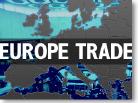|
Bigger beefs lie ahead
|
 |
March 5, 1999: 3:31 p.m. ET
The banana dispute between Europe and the U.S. is only the beginning
|
LONDON (CNNfn) - Has the world gone bananas? The slippery yellow fruit is at the heart of a multibillion dollar argument between Europe and the U.S. that threatens to destabilize the entire world trade system. It's not likely to end there, either.
The European Union's banana dispute with the United States has rumbled on for years, with U.S. officials growling about imposing sanctions and EU representatives attempting to have U.S. measures thrown out. "This is the first dispute to have gone this far," a person close to the talks told CNNfn.com, "the system is being tested for the first time, and these governments are in new legal waters."
There are plenty of other bones of contention however, and the banana case could be just the first of many to upset relations across the Atlantic in the coming months.
Another trade beef on the radar
At present some 70 disputes are being mediated by the World Trade Organization in Geneva. A U.S.-EU dispute over hormone-treated beef is just a few weeks away, and the issue of genetically modified food is almost certain to cause a fight. A U.S. ban on Concorde, the supersonic jet, is also in the pipeline. "There's a lot of concern over the beef hormones issue," the source warned, "it could give rise to a dispute along the lines of bananas."
The banana case could be the spark that really ignites the fireworks, however. Both sides have taken entrenched positions, and the WTO mediators seem unable to find a consensus path out of the maze of arguments. WTO boss Renato Ruggiero, with only eight weeks left in his stint as head of the trade organization, called on both parties to act in a "positive spirit".
His attempts at cooling the situation appear to have had little effect though, and EU trade commissioner Sir Leon Brittan told CNNfn Friday the U.S. was "behaving like a rogue state" in implementing sanctions before the WTO's final decision. Brittan said "hysterical political pressure" was driving the United State's actions, and described U.S. officials as "mealy-mouthed."
U.S. efforts to impose sanctions worth $520 million against a variety of European goods have raised the stakes still further. April 12 is the next date at which attempts to raise 100 percent tariffs on items such as cashmere sweaters from Scotland and cheese from Italy can be pushed through officially. The U.S. this week forced importers of the goods on the sanctions list to post bonds covering the extra tariffs, infuriating the Europeans.
For its part, EU negotiators are plugging away to persuade WTO officials that the U.S.'s "301" laws allowing it to pursue punitive sanctions themselves violate WTO rules.
If that all sounds like a mess, it is.
Feelings are running high on both sides, and U.S. trade envoy Rita Hayes described the latest maneuverings by the EU as "obfuscation and retribution," and "a diversionary move."
At least there are some hopes for a resolution of the crisis. Jerry Evans, European strategist at Enskilda Securities says the seemingly bizarre list of goods the United States is proposing to punish is a sign of an intent to force a compromise solution. "The U.S. could have gone for the jugular, but it decided to make an issue of it [banana imports], without causing massive problems."
Real problems will begin if the U.S. decides to go for some bigger targets with its sanctions. Strong brand names are where the U.S. could really make a mark, according to Gary Dugan, European strategist at JP Morgan in London. The likes of giant food producers such as Danone and Unilever could be next in line for sanctions.
Stock markets stay above the fray
Stock markets have shrugged off the vitriol from politicians on both sides of the Atlantic, however. "These situations often provide buying opportunities, rather than reasons to sell stocks," said JP Morgan's Dugan. "We've seen all this before. They argue, and then they resolve things." That view seems to be shared by many financial observers, and there's been little sign yet of financial markets being spooked by the prospect of a trade war.
The U.S. is certainly no stranger to such trade disputes. Unofficial figures suggest it has been involved in roughly half the 160 disagreements brought to the WTO. The United States has brought cases to the WTO on approximately 53 occasions, and has been cited as a defendant around 29 times.
The current problem appears to go much deeper than previous issues though, and international trade lawyer Iain MacVay at consultants Rowe and Maw warned the whole system of regulating world trade could be brought to its knees if the dispute continues to escalate. He pointed out that the European attack on the U.S. "301" trade law, backed by Japan, strikes at the heart of U.S. trade law.
The timing of the collapse in relations between the world's two largest economic blocs is an embarrassment for the WTO. A meeting of trade ministers is scheduled for Seattle in November -- a meeting in which it was hoped that developing nations such as India and Brazil could be brought into the WTO. The dispute between two of the WTO's supposedly staunchest supporters seems certain to cast a long shadow over that meeting.
Bananas are the key to U.S.-European trade relations for now, but neither region grows the fruit. Given the lack of jobs at stake, other than in the far-flung countries of Latin America and the Caribbean, there appears to be few political points to be won. Much bigger beefs between Europe and the U.S. could lie ahead when more emotive issues such as chemically-doctored foodstuffs hit the negotiating table.
-- by staff writer Rod Cant
|
|
|
|
|
 |

|

